Mette Ivie Harrison's Blog, page 51
February 18, 2013
Bad Advice for Writers On Conference Panels
Make sure to mention that your book is better than Harry Potter, Twilight, or whatever bestseller you can think of.
Insult readers of your genre by telling them that no one has ever written anything good before you in it.
Be sure to go on for ten minutes about the intricate plot details of your book whenever anyone gives you an opening.
Singing and offering bird sounds is a great way to make readers intrigued about your book.
Explain how each book in your ten-book series fits together.
Read aloud letters from young readers in their entirety about how much they loved your book, whether or not they are related to you.
Treat everyone you know as potential buyers of your book and try to get them to buy it out of the trunk of your car.
Talk to people in the fake language you have invented, just to pique their interest.
Talk over other authors on panels, because the more time you have to talk about your book, the more people who come to the panel will buy it.
Make vast generalizations about the audience for your book.
Give inflated numbers for the sales of your book that no one could possibly believe, since they are an order of magnitude higher than Rowling or Meyer in their heyday.
Tell people how stupid readers are and how easy it is to fool them into buying and liking your books.
Do an interpretive dance of your book.
If you see anyone near by who meets your eye, do a hard sale on them.
Litter the convention hall with promotional material about your book.
Complain that the bookstore does not have your book because they are “in league” with traditional publishing to keep independent publishers out of the money.
Monopolize all conversations with other authors.
Talk about the formulas you used, like “colors,” to really “get into” your characters' heads.
Talk about the most stereotypical romances ever and how you match them point by point.
Insist loudly that Stephenie Meyer is a terrible writer and that only stupid teenager girls like her books.
February 15, 2013
Friday Tri: Hair of the Dog That Bit Ye
There are days
when I wake up really sore and tempted to stay in bed all day because
I don't feel like doing anything. Sometimes that is the right thing
to do. But there are also days when it makes a lot more sense to get
up and do a little of what you did the day before that hurt you, just
to get your muscles moving again.
If I have done a
really hard running workout, doing some very slow running or even
some walking can help to work out the muscles and I always feel
better after doing 10-20 minutes. If it's a biking workout, the same
thing goes. (I rarely feel sore after swimming, and maybe that means
I don't push hard enough in the pool, but I think it's just a reality
of all the cushion of that water).
If it's a weight
lifting workout that has me sore, I have to take stock and decide if
I'm really injured (in which case doing more to the muscle will only
aggravate it) or just sore. If I am only sore, I will usually elect
to do something that works the same muscle group, but not the exact
same exercise. So if I did power snatches, I may do some pushups or
some assisted pull-ups. I go way down on weight to maybe 50-60% of
what I did the day before. I just want to warm up these muscles.
Some days, if I
feel like it, I will just do yoga or stretching to get my muscles
warm and ease some of the tense spots up. Yoga is great for lots of
things and most people don't do it enough, thinking they're better
off with 10 more minutes of cardio or weights. You're not. Yoga is
possibly the best thing anyone can do for better mobility and a more
pain free life.
I won't say it
always works to warm up sore muscles, but it almost always works. It
seems counter-intuitive, but yes, go take some of the hair of the dog
that bit ye and you will feel better afterward.
February 14, 2013
Rules of Romance #1: Names
February 13, 2013
Writing Wednesday: Stealing All The Way
Problem: writing a book because you liked someone else's book could lead to you copying that book and losing your voice. We are always taking inspiration from other authors. I have no problem with stealing. But if you are going to steal, you have to go all the way. You have to steal it completely. You have to steal it and then sit on it and sleep with it, and twist it so that no one will ever recognize it. The best thieves are the ones who can walk right out of a museum or a store, and they have the stolen item with them, but no one sees it. That's who you are.
So take what you like from others, and then make it yours utterly. That's real originality.
February 12, 2013
Fictional Motherhood #8: Mrs. Bennet and Mrs. Dashwood
There are other mothers as figures in the minor characters of the books. Mrs. Bates and Miss Bates are visible as characters, but we don't feel much for them but pity and a little annoyance, as Emma herself does. Frank Churchill's relationship with his foster mother is rather looked down on. She manipulates him with her illness. He does what she asks because she is rich. Not a particularly good mother figure, but neither do we know much about her personality. Jane Fairfax? Who is her mother? No real knowledge there. Harriet Smith has no mother, either. We have Lady Catherine de Burgh as an example of one of the most overbearing mothers in literary fiction, and her daughter Anne has no personality at all, it has been so swallowed up by her mother. The example of Mary Elliott Musgrove's mothering to her sons is not particularly inspiring, either. She is also a hypochondriac who seems to have little to do with her time except take up other people's. I don't know whether to feel sorry for her or not. She chooses to go out to a party while her son is ill at home with Anne.
So, the main mothers of Jane Austen's fiction are Mrs. Bennet and Mrs. Dashwood. Mrs. Bennet is a rather ridiculous figure. Her husband has no patience with her and we laugh at him poking fun at her. We feel sorry for him that he is stuck with a "silly wife." He chose to marry based on beauty rather than wit, and he gets to some degree what he deserves, which is to stay in his library most of the day while his wife allows their daughters too much license--and Lydia goes wild. Jane and Elizabeth are, we think, more to the credit of Mr. Bennet than their mother. But what kinds of assumptions are we making here?
Mrs. Bennet (like Lydia) loves the beach. She loves a soldier's uniform. She loves dances and parties. She loves socializing. She wants to see her daughters married. She tries to get her husband to do things to help her daughters be married. These essential facts really do not merit the negative, censurious view we often take of Mrs. Bennet. Is she less intelligent than her husband? Well, she would certainly have less time to spend in the library. She does not retreat from social interaction as he does. She thrives in it. She is most happier than he is, as well. He makes fun of his neighbors. She enjoys their company.
For years, I have enjoyed looking down on Mrs. Bennet as Mr. Bennet does, but I am a bit more critical of this attitude now. She is one of the few mothers in fiction we actually have an idea about, in terms of personality. She is supposedly foolish, but honestly, her attitude seems far more likely to lead to happiness than her husband's. And if she isn't smart, then is that her fault or the fault of her parents? And her husband, who spends so little time with her and just makes fun of her? She doesn't read a lot--so what? I imagine what it would be like as a parent to know that your two older daughters look down on you as your husband does. How painful would that be? And yet she still tries her best to give them advice. She doesn't like Mr. Darcy, but then, neither does Mr. Bennet. How had is her judgment there? I find it interesting to look at the various movie versions of Mrs. Bennet and see which actresses play her as feckless and which play her as having a distinct, interesting pov. I like the Kiera Knightley version for this.
And on to Mrs. Dashwood, the second wife of John Dashwood, who married a much older man as Marianne marries Colonel Brandon. Presumably she was very pretty in her day and she still considers herself young, based on her setting down of Marianne. She is not much older than Colonel Brandon herself, and one wonders if they might have been a match. But no, of course not. No mother would marry a man who would be suitable for her daughters. That would be taking their chance from them. But is there any hope that Mrs. Dashwood will ever marry again? What about Cousin John? This is not something that Jane Austen really goes into. Mrs. Dashwood is a mother. She does not really have any personality beyond her mothering. No wishes beyond what is best for her daughters. No thoughts beyond propriety. Her only flaw is that she is bad with money and therefore has to have Elinor help her find a proper place to live and to buy the proper food.
What to make of these mothers in Jane Austen? Perhaps nothing more than that Jane Austen was not a mother herself and therefore did not see that pov very clearly. She certainly watched mothers carefully enough. And she mocked many characters in her fiction, not only mothers. But spinsters seem to have more personality than mothers. Maybe that was one of the costs of motherhood that she calculated in her decision to remain unmarried. Maybe in her mind, having an interesting personality was something that was sacrificed for children. Jane Austen herself seemed to feel that she could not have both literary children and literal children. We live in different times, or at least I hope we do.
February 11, 2013
Monday Book Recs--Seraphina by Rachel Hartman and Shadow and Bone by Leigh Bardugo
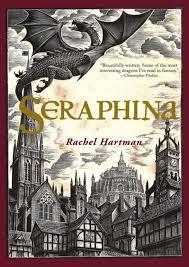
This is a really refreshing dragon book with a strong, believable romance. I loved the main character, Phina, and the gradual unfolding of her history. I also loved the Prince and his many interesting and awkward conversations with Phina. In addition, there are a number of side characters who are fully fleshed out and riveting. The plot is intricate and comes to a drum-pounding conclusion.
But over and over again, I found myself considering what the meta-text of this book was. What was the author saying about us, and about our dragons? Who are the people around us who can change into other forms? What does it mean if we try to seek them out and expose them? What does it mean if emotions are human and other creatures cannot experience them unless they have human form? Are emotions something that we would get rid of it, if we could? Are emotions something that truly are valuable, and the only thing that makes us human? Does love make us better than what we would be without love? What would we give up to gain the chance to feel love?
I can't say that Hartman answers any of these questions directly, though there are certainly characters who give answers. But then again, I wouldn't want to be hit over the head with answers anyway. I like the idea that I'm sitting with the author over a long tea, discussing all the most important questions in the universe, and giving scenarios in which different answers might be offered, but are never quite decided upon.
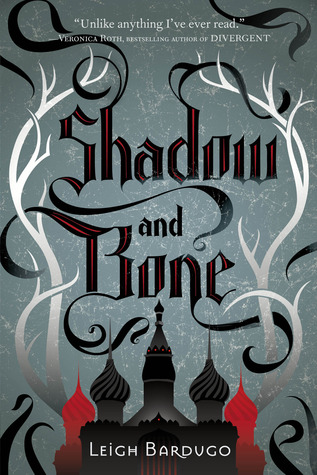
This is a great Russian-inspired fantasy romance. I enjoyed being fooled briefly by the "wrong" hero, and I found the resolution to the triangle very satisfying (which is unusual, since I often hate love triangles). I liked the Grishas, their keftas, and the world-building here. I liked the history and the menace of the Shadow. Most of all, I liked the character Alina. She tells the story in first person (mostly) and I found her likeable and strong.
In this novel, the questions I had mostly centered on the nature of evil. Is a villain someone who is selfish? Someone who has too much power? Someone who lies? Someone who manipulates and uses others as pawns? Or someone who imagines a peaceful world and will do anything to get it?
I am not often satisfied by a lack of conclusion in a novel, but in this case, I strongly did NOT want to see the villain punished and killed and I hope to see a sequel where he appears again and deeper questions continue to be asked.
February 8, 2013
Friday Tri: Getting Over Yourself
I spent about 6 weeks being super
frustrated at Cross-Fit because I could only very rarely and with
great pain manage the “RX” set listed for women. The coaches
would come over while I was trying to lift something near the RX and
take my weights down and I would feel like they were telling me that
I wasn't “good enough.”
Then last week, I overheard a
conversation that one of the coaches was having with another of the
coaches. She said, “You know, after 2 years at Cross-Fit, I've
gotten over myself. Some days, I come in and I don't feel up to doing
the RX set, so I don't worry about it. I just do what I feel up to
doing, and that's enough.”
Somehow, this changed my world. If that
was what a coach was saying, then why wasn't I saying it? And I gave
myself permission not to do the RX when I couldn't. I don't know if
that changed how much weight I could actually lift, but it changed my
attitude about Cross-Fit (and myself) enormously, and I think that
was very important. Instead of walking in and feeling like
oh-boy-here's-another-workout-I-can't-complete, I walk in and tell
myself I'm going to do what feels good. I'm going to get better, but
I'm going to not be there yet, and that's OK.
On Wednesdays, we were doing “cleans”
for only the second time for me in the last two months at Cross-Fit
and one of the coaches came over and told me how much improved I was
over the last time (the first time in a workout). She was apparently
astonished at how good my form now was. My weight wasn't there, but I
have to start with form, so I was proud of myself.
I was reminded strongly of the first
several years I went to my writing group, so long ago, when I was a
wannabe. I wrote something new every month, or I revised extensively.
And every month, one of the other writers (Carol Lynch Williams) told
me how astonished she was at my improvement. I was listening, which
is actually fairly rare. Sometimes I lost something in translation,
but I was moving forward all the time, and that was what mattered.
It doesn't matter where you are now. It
matters what your attitude is about the future and how you're going
to be there. And how you treat yourself now.
February 6, 2013
Writing Wednesday: How (NOT) to Streamline Your Career
Yes, there are authors who have good advice about how to make more business-savvy decisions in the publishing world. I am not one of them.
Yes, there are ways to make sure that money comes to you by avoiding scam agents and scam publishers whose only interests in your career is making themselves money. I never had a problem with this, by simply following the rule of thumb that if someone really is legitimate, there is really little doubt about it. People who are too effusive or who guarantee things are not to be trusted. Real publishers will offer you real money and will disclose the amount. They will then send a real contract and a real check following.
Yes, for some authors, publishing is a business and they have to look carefully at what activities earn income and what activities do not, and then tailor their activities to those that produce money. I am not one of these, either.
The more I think about writing as a career, the less interested I am in it. I do not mean to sneer at others. I am lucky in that I have other streams of income unrelated to writing. I also planned my life this way, but luck was involved in achieving these goals. What that means is that I can write projects that I want to write. I don't have to sell them. I don't have to worry about every word, every minute of my writing time, being for a paid project.
I suppose there could be a reasonable argument about how much commercial pressure is actually useful for an artist. I'm not particularly interested in that discussion. I think I put plenty of pressure on myself without the need to have external deadlines, etc, added.
But let me go back to the idea of "streamlining." Streamlining is all about efficiency. It's about making things aerodynamic. It's about cutting out the extraneous. It's about fat and waste and stuff that can't be counted or measured.
Well, hmmm. That's pretty much art, isn't it? We are so used to thinking about successful art in terms of numbers, data, book sales, advertising, and so on. But that isn't art. Art can be sold and commercialized. But art is by its very nature the extraneous, the inefficient, the uncountable.
I am someone who loves to count things. I really do. I derive immense satisfaction from watching numbers rise and having control over them. But I am also able to see that there are times when counting is not helpful, and there are things that simply cannot be quantified. I think about how No Child Left Behind has become the metaphor for this reality. We in America seem to believe that if anything is real, it can be tested and quantified. This may be true in some theoretical model, but I think it isn't. I think that there are things, art among them, that have a value that can't be measured. And of course, I say this well aware that art is quantified every moment. Our culture devours art as soon as it is produced and puts a price tag on it. But that isn't the art. Not really.
I read a really important essay in grad school by Walter Benjamin about art in an era of mechanical reproducibility. Benjamin was a Marxist (who died in WWII at the hands of the Nazis) and he hoped that television and film and being able to let everyone in the world see beautiful art was going to revolutionize us. Everyone would have access to art. All the best things that used to be in museums or only available to the wealthy who could afford to own the real thing would be available to everyone. And in some ways, our youtube/internet/piracy world is a world that Benjamin would have cheered. In other ways, not so much.
We have access to great paintings at the touch of a button, though we still can't see all the details that the actual piece of art would give you. Even so, there is something wonderful about being able to experience art so easily. Perhaps this ease is one of the reasons that we don't think about the value of art anymore. Either art is commercialized and quantified with a price tag (movie ticket or book price), or it is "not-art" (what my husband calls the youtube videos he doesn't like--a stick falling in the forest).
Art is your own self-expression. The value others place on your art does not, in fact, make it more or less your self-expression. You may decide that you wish you could increase your ability to communicate your expression and then you improve your skills. Your art may then have a higher price tag or it may not. Yet again, this does not mean that your art is less art. Only 3 people in the world may ever find your art. Still, art.
The more we think about our art as a product, I think the less we are artists and the more we are producers. Look, I don't mean to say there is anything wrong with having a job, or even making money making art. But the money making part is actually almost entirely separate from the art creation. Or maybe it is more separate for some people than it is for others. I am not sure. But when I sit down and write my words on my computer, they are always my words.
No matter how much my editor or agent or publisher tells me they want the story to be thus-and-such, the words are still mine. The expression is still mine. This can lead to enormous frustration on all our parts, as the people who are not the artist try to quantify the art or figure out how to change it to fit some category that will make money as a product. Again, this is a process separate from the art.
Or at least I want the two to be separate. More and more, as I age as an artist, I am less concerned with the validation that comes from a contract or sales and more concerned with my own judgment of my art. And not the brute "good" or "bad" judgment either (though at times, that still needs to be made, sadly). It is simply a matter of whether or not I was true to the thing I wanted to express. Did this story do its job well? Did I express the feeling that I wanted to express with this story? Did I evoke the experience I wanted to evoke?
I was going to add, did I make the reader feel something, but actually--no. I can't make readers feel things. That is their own choice, and that reaction, too, has to be separated from my creation of the art. On some level, ultimately, I am standing in a vast, empty white space, just me and my words, and I am the final judge of whether it is true or not, because the only person it can be true to is me.
If this sounds solitary and scary, well, it is. There are wonderful ways in which an artistic community can be helpful in helping maintain the energy necessary to create. But the community doesn't do the work. Only the artist does the work. The artist in that empty room of the mind.
February 5, 2013
Fictional Motherhood #7: Buffy the Vampire Slayer
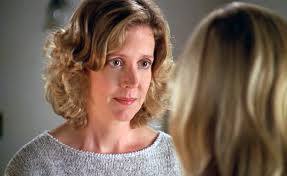
That said, there is a lot of traditional motherhooding going on in season 5 in particular (some in season 7, as well). In the early seasons, Joyce Summers is a warm, very traditional single mother. She is protective of Buffy, but she is also a bit dim. We laugh at her not understanding what is going on with Angel and Spike. We feel sorry for her when Buffy leaves after the ultimatum, and then Joyce spends months wondering if she will ever see Buffy again. One of my favorite episodes is the one with John Ritter as the wannabe robot-step-dad, and how Joyce likes him just fine for quite a while without there being any visible magic going on. She wants structure and order and someone dependable, someone who follows the rules, and Ritter's character is all of those.
But does Joyce ever rise beyond being a traditional mother? She has a job that she appears to be sometimes good at. But she is also home a lot of the time when Buffy needs her. The failure of her marriage appears to be completely her husband's fault (whom we see only a couple of times). In the episode where Buffy is in a mental institution, we get little more sense of Joyce as an individual with her own interests and desires. For instance, do we ever have any idea what her favorite color is? What her favorite food is? What she studied in college? What her hopes and dreams for herself are? I don't think we do. Her identity is completely subsumed in being a mother to Buffy. Which makes sense since this is a TV show about a teenage girl and teenage girls very rarely are able to see their parents as anything other than fulfilling (or not fulfilling) the proper parent function.
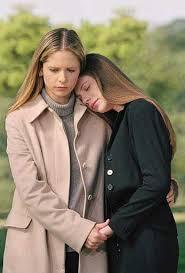
When Buffy is no longer a high school student, everything changes. Season 4 is generally considered an awkward season as Buffy attends the local college and has a relationship with an "ordinary guy" Riley. Whether it is because there is no chemistry between the actors or because of the season arc focused on a teacher with a plan to improve humans through robotics, I am not sure. But when I started watching season 5 and suddenly there was a sister, I found myself nodding my head. It makes no sense in the first few episodes because there is no attempt to explain what has happened to make Buffy have a sister, but in terms of story, it made all the sense in the world. This was what Buffy needed. She needed to move from being a selfish, teenager child to being a more responsible adult, and having a younger sister to depend on her was a way to do it. All of season 5 ends up being about a magical reason that Buffy suddenly has a sister, but the real reason is simply that the story needs this to happen in order to mature into a different kind of telling.
The final episode of season 5, "The Gift," was necessary in part because no one knew if there would be a season 6 or 7. The show was constantly in danger of being canceled, and so there were always attempts to have a great, finale in case it really was the final finale. Again, I am not saying there is anything wrong with Buffy or with this narrative choice. But I think it is useful to look at it carefully and examine it on all sides and see what it means that this choice was made and that it resonates so strongly, especially with the female viewership. "The Gift" is the culmination of season 5's growing up of Buffy. She isn't a teenager herself anymore. And what does that mean? Well, jt means that Buffy becomes the mother herself. The first thing that has to happen for Buffy to become the real mother of this show is for her own mother to die. Hence, the other reason for "The Body," besides just that it is great storytelling.
And once Joyce is dead, then all the decisions rest with Buffy. She has to be the one to take care of Dawn because she's the only one left. All that pressure is on her that was once on her mother. She doesn't lose her individuality completely, but her choices certainly become more limited. Her whole purpose becomes the survival of Dawn, a sister she didn't have until the beginning of this season. Part of the reason I think this makes so much sense is that growing up for a woman is synonymous with becoming a mother, and with sacrifice. I suppose you could argue about whether or not that is true for men. Becoming a father and sacrificing for children IS an important storyline in some movies and TV shows about men. But I'm not sure there is any other storyline for women who have grown up.
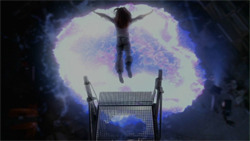
This is the dramatic moment when Buffy throws herself into the void to save Dawn. It is emotionally powerful and for me, as a mother, I had a strong sense of connection. You don't know, when you have children, what those children are going to be like. You don't know if they are going to be monsters or threats to the world. You don't have any guarantee that you've done anything right in raising them. And yet, even so, you are expected to give your life for those children. That is what mothers do. They don't think about if it makes sense. They don't weigh the costs to the world of their own lives or deaths. They simply react in the way that motherhood demands. And motherhood demands giving up yourself completely. Dying is really just a metaphor for that self-sacrifice, a dramatic one, but very telling.
And in season 6, when Buffy is unwillingly brought back to life, she becomes the rather bad mother. She is selfish, sexual, and needy. She has wants, and she doesn't pay attention to where Dawn is all the time or what she needs. She doesn't realize Dawn has become a cleptomaniac. Season 6 is on some level all about Dawn and how Buffy's bad mothering ruins her (perhaps to some extension, how her bad mothering also ruins Willow, Xander, and all the Scooby gang). But for the first time, in season 6, we are seen mothering from the point of view of the mother. We get to know that Buffy was at peace and was yanked back to this world because her friends "needed" her. They needed her to be alive again, to save the world for them again. They needed her to be their mother.
And Buffy doesn't want to be their mother anymore. She wants to do what *she* wants to do. She wants to feel things. She doesn't want to be a mere function of motherhood, which is what season 5 left her as. She wants to be alive. She wants to make wrong choices, because they are *her* wrong choices. She wants to have a life separate from her family. She wants secrets and she wants to do things that aren't part of her mothering role. This is, I suspect, part of the reason why so many audience members reacted badly to Buffy season 6. It makes sense to me, as well, that it was Marti Noxon rathe rthan Joss Whedon who was at the helm of this season, because I wonder if only a woman can see how the fictional demands of perfect motherhood mess us up as women.
In season 7, we go back to Buffy as the good mother, with a new group of children to care for--the potential Slayers. Audiences seemed to like this tamer version of Buffy much better. She was "good" again because she was doing what women are supposed to do, which is willingly accept tha tthey have no more personality or agency once they have accepted the only adult role that exists for women, that of the self-sacrificing mother. Women who refuse to accept this role are eternal teenagers, and we don't want that for Buffy, either. We tried that in season 5. It didn't work. It didn't make us like Buffy. It made us feel like she was never going to grow up and we were impatient with that.
February 4, 2013
Monday Book Recs--Claws by Rachel and Mike Grinti and Blackwood by Gwenda Bond

Claws by Rachel and Mike Grinti
This may sound like a typical middle grade about a girl who can bond with animals and has to stop the fairies from stealing her older sister. But there is both more fun here and more warmth than I expected. The fun is with the cats that are Emma's pride, all with distinct personalities and motivations. The warmth is in the relationships with her father and mother and her sister. Even the "villain" characters at the elementary school where Emma is tormented for her magic turn out to be not-all-bad, and Emma's kindness in looking out for them really touched me. The plot is quick-paced and clear. I especially loved the Rats. So inventive that I am still thinking of them.
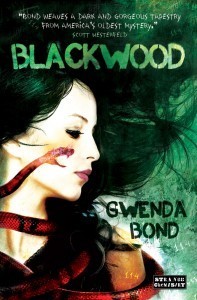
Blackwood by Gwenda Bond
I finished this book in one day, which says a lot considering my current schedule. I have to say that the thing that really pushed my buttons was the history. When I was a teen, the history of Colonial America and its relationship to the British Isles was just something I obsessed over again and again. I loved Arthur stories. I loved Queen Elizabeth and Mary Queen of Scots. I loved Walter Raleigh and even King Henry VIII. I also really liked the real, scary stories that came from those first years of colonization. And yes, I was eternally intrigued by Roanoke. I had my own theories about what happened to the people there (hurricane was one of them, also alien abduction). I am so glad that another author got to write about all the details like John Dee, the magician to Queen Elizabeth's court who was quite a shady figure, and alchemy, whihc was essentially looking for the secret to immortality, and everything else. So delicious.
But I suppose you could mess up those wonderful elements. Gwenda Bond doesn't. The front story, which is set in the present day, is just as interesting. A girl (Miranda Blackwood) whose father has a twisting snake tattoo/birthmark on his face, who then dies/is murdered and the scar transfers to Miranda. So many fun, creepy details about his death (won't ruin them all), including the disappearance of 114 people in the modern day. What would really happen if that kind of story broke? I think she's got realistic details right here, and the other story, about Phillips Rawlings, who is dealing with an ancient family gift of hearing the voices of the dead, and who has spent several years off the island masquerading as a juvenile delinquent, purely to get away from those voices. I loved it especially when Miranda tries to get off the island.
I was a little late getting to this book, but it's a grand read!
Mette Ivie Harrison's Blog
- Mette Ivie Harrison's profile
- 436 followers



